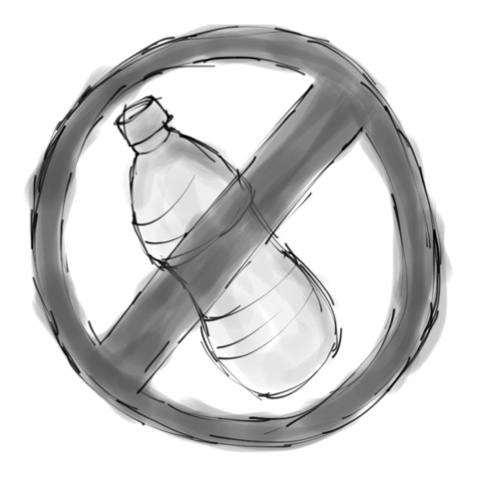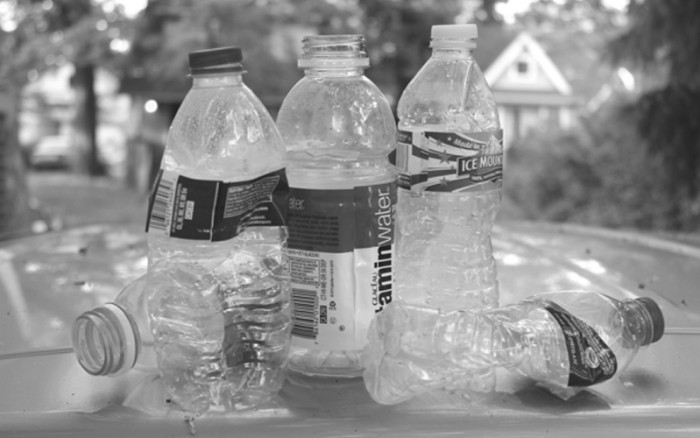Ban the Bottle – San Francisco moves to ban plastic bottles in a bid to help the environment. Should Ferndale follow suit?
Story by David Wesley Photos by Jeff Lilly
San Francisco may implement one of the strictest bottled water bans in the country if the Board of Supervisors approves a proposal to ban its sale on public property. The proposed legislation from Supervisor David Chiu would gradually phase in a ban on the sale of bottled water of 21 fluid ounces or less on all city properties with leases signed after 2014 and at concerts, large events, parks and food trucks. “Given our access to incredibly healthy clean and tasty Hetch Hetchy water, which is some of the highest quality municipal tap water in the country, it just doesn’t make sense for us to have this addiction to plastic water bottles,” Chiu told the San Francisco Examiner. [Pub. note: The Hetch Hetchy Reservoir provides San Francisco with its drinking water.]
The city’s Board of Supervisors approved the measure unanimously in May; it will head to the mayor’s desk after one more board approval. Violators of the ban found selling plastic water bottles 21 oz. or below on city grounds after October 2015 will be subject to a fine up to $1000, according to the San Francisco Examiner. The ordinance exempts sporting events and gives food trucks and large nonprofits until 2018 to comply with the new ordinance. “We all know with climate change, and the importance of combatting climate change, San Francisco has been leading the way to fight for our environment,” Chiu said, according to SFGate. “That’s why I ask you to support this ordinance to reduce and discourage single-use, single-serving plastic water bottles in San Francisco.”
San Francisco isn’t the first city to consider such a policy. For years there has been concern in Ferndale on how to affordably keep the city clean. As a city big on recycling and re-purposing, it’s no surprise both the citizens and politicians of Ferndale have discussed more beneficial means of recycling. Former Ferndale Mayor Craig Covey weighed in with Ferndale Friends about similar pieces of legislation he proposed for the city. “When I was on Council and Mayor, I got a resolution passed that the City itself would not buy water in plastic bottles, though I doubt if anyone follows that anymore. We also wanted to ban plastic bags at stores, grocery stores, but our city attorney claimed that we would not have the right to do so, that state law may trump our ability to do that.”
 Not everyone approves of banning plastic, however. Former School Board President Keith Warnick has worked in the plastics industry for 40+ years, and he describes the proposed ordinance as “Just another in a long line of ‘feel good’ legislation suggestions that we have been hearing for years.
Not everyone approves of banning plastic, however. Former School Board President Keith Warnick has worked in the plastics industry for 40+ years, and he describes the proposed ordinance as “Just another in a long line of ‘feel good’ legislation suggestions that we have been hearing for years.
The number of plastic bottles (PET) being recycled has doubled in the last ten years to nearly 30 per cent. With continued education of our citizens and young children we can expect thosenumbers to continue to rise. Those bottles save about 4 barrels of oil for every ton recycled and there are millions of tons recycled. They become items such as clothing, carpets, filling for pillows; insulation, baby seats, benches and non-food containers and more. Some of the top beverage manufacturers are advancing technology and addressing consumer’s concerns. Nestle, maker of Resource® & Arrowhead® bottled water, has reduced their plastic content by nearly 40 per cent while using 50 per cent r- PET (recycled PET) in many of their bottles. They also contribute to the Michigan economy with a bottled water plant in Stanwood, Michigan. Recycling uses less energy than producing new bottles.”
In San Francisco, the sales ban at events of 100 attendees or more on public property would be fully implemented in 2016, and the City would need to ensure there is access to an alternative potable water supply. To make the initiative feasible, the city will study how to better supply water at events and prioritize installation of water fountains and reusable bottle filling stations.
Similar steps could be taken in Ferndale to help reduce the city’s annual city spending. Prohibiting the use of City money to purchase bottled water could send an extraordinary ripple throughout Ferndale’s economy, just like in San Francisco, where the initiative shaved $500,000 off of annual city spending on a product environmentalists warn creates waste and uses excessive natural resources.
Business Insider estimates that bottled water production uses 17 million barrels of oil per year and requires triple the amount of water to make a bottle as it does to fill it. “We thought it’s important for the city to set our own example first to show that this can be done easily, well and in an environmentally conscious way,” Chiu said.
San Francisco’s ban follows similar laws elsewhere. Concord, Massachusetts outlawed all sales of single-serving bottled water in the city in January. Currently, for Ferndale, such serious steps have not yet been taken, but many people would like to see a greener Ferndale, helped along by introducing and imposing sensible legislation that concerns itself not only with the status quo, but with the economic and ecological concerns of our time. Americans use 50 billion plastic water bottles a year, according to an anti-plastic bottle campaign called Ban the Bottle, and just 23 per cent of those are recycled. If the political leaders in Ferndale would seriously consider adopting a similar initiative, the impact both economically and environmentally could help boost the city further at home and nationally. Steps are being taken in both East and West Coast cities. Maybe it’s time for the best that Middle America has to offer, to reach for a working model for healthier and wealthier cities.
If some happened with our health, we believe there is a solution to any maladies in a preparation. What medicines do patients purchase online? Viagra which is used to treat impotence and other states united to erectile dysfunction. Learn more about “sildenafil“. What humanity talk about “viagra stories“? The most substantial aspect you must look for is “sildenafil citrate“. Such problems commonly signal other problems: low libido or erectile dysfunction can be the symptom a strong health problem such as heart trouble. Causes of sexual dysfunction include injury to the penis. Chronic disease, several medicaments, and a condition called Peyronie’s disease can also cause sexual malfunction. Even though this medicine is not for use in women, it is not known whether this treatment passes into breast milk.



